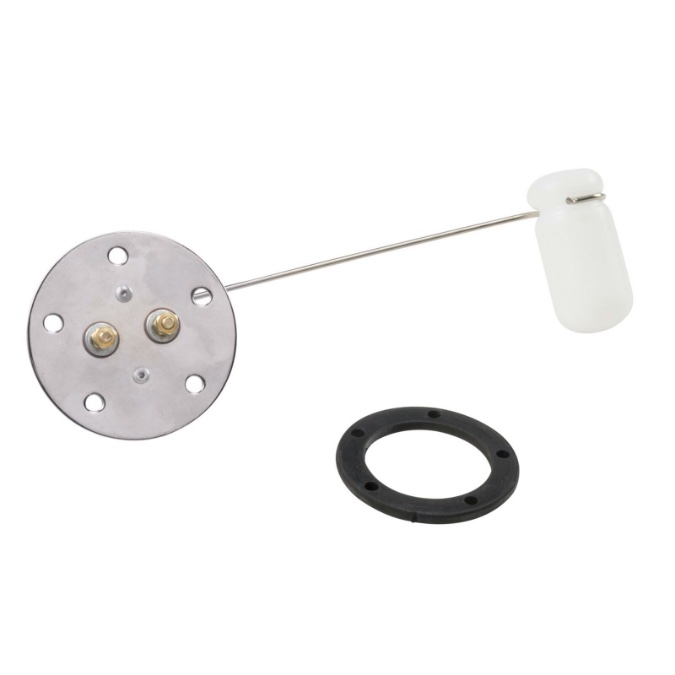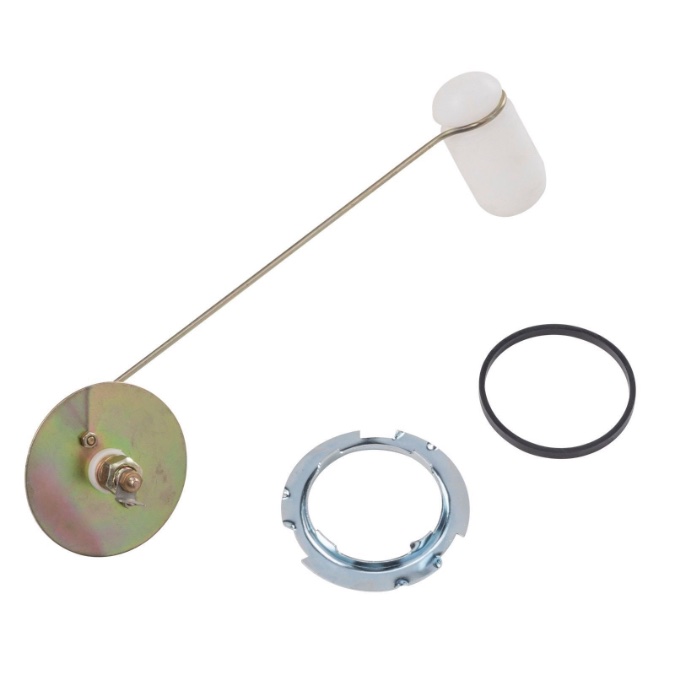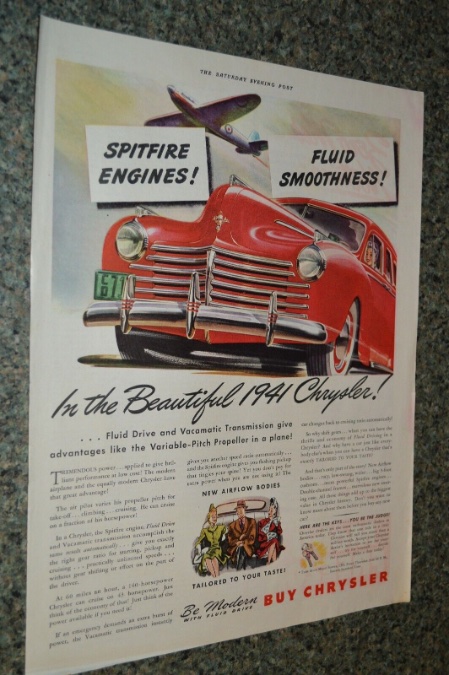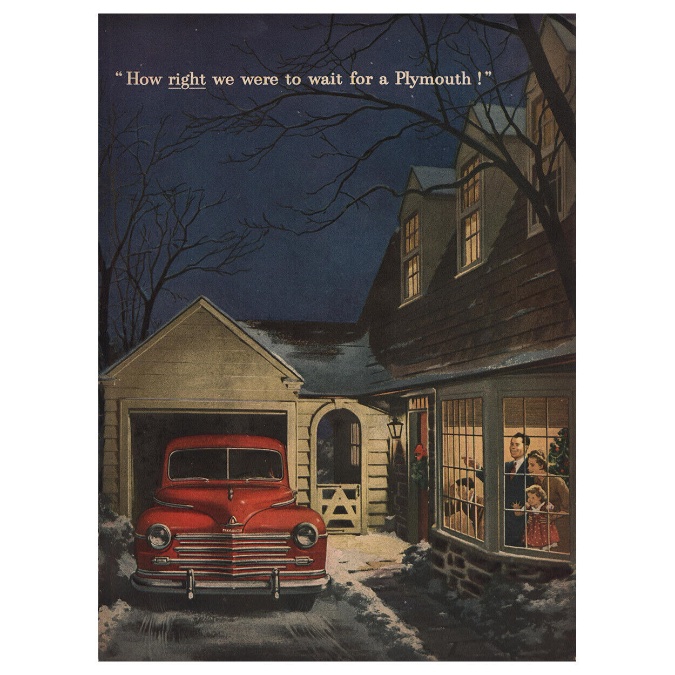-
Posts
1,860 -
Joined
-
Last visited
-
Days Won
10
Everything posted by MarcDeSoto
-
No way that hole is for a speaker. The speakers were placed on the middle of the dash in 1950. Nothing goes there except the cardboard or leatherette package shelf. Those bolts holes are probably for the mounting of the very optional AC vent. That's where the cold air comes out, not the front area. I'm not sure if AC was really availible in 50 on Dodges, but Chrysler had been planning on offering it as early as 1942. My 48 has holes on the package shelf, but not that middle hole like yours. I think Chrysler started to offer AC in '51.
-
I checked my 48 DeSoto business coupe and it doesn't have any holes there. And a business coupe doesn't have a back seat.
-
Could it be a hole for the seat to anchor into? Could it be for water drainage? I don't know. If it's not for those things, I would cover it up to stop CO from entering the cab.
-

Just got a new fuel gauge sending unit for 48 DeSoto
MarcDeSoto replied to MarcDeSoto's topic in P15-D24 Forum
Found out they don't make sheet metal screws with fine thread, so I went back to HD to buy #8 32 1/2" round head screws. The Parts List calls for 3/8" screws, but these newly made sender units are about 1/16" thicker than the original. I had to tap the threads in the tank to get all of the screws to go in, but they finally did, so the installation was successful. -

Just got a new fuel gauge sending unit for 48 DeSoto
MarcDeSoto replied to MarcDeSoto's topic in P15-D24 Forum
Already been there and done that. Those don't screw in because you need a screw that comes to a point because the holes are kind of jagged. I did get one of those machines screws in, so maybe I could tap the other holes and use them? -

Just got a new fuel gauge sending unit for 48 DeSoto
MarcDeSoto replied to MarcDeSoto's topic in P15-D24 Forum
I wish they would include the screws with these sending units. I can't find the #8 32 X 3/8 screws anywhere. I found this size but it was a machine bolt with nuts. Those can't screw in unless you are lucky. I bought a #8 X 3/8 sheet metal screw, but that won't work because it has coarse thread. -
I assume that this sending unit is installed with the float slanting toward the front of the car. Mine has two wire terminals to the top of the unit. I was surprised to learn that in the new 49 model Mopar cars changed to a new type of sending unit with just one wire. The two wire sending units are called the thermostatic type, and the one wire units are called the electrostatic sending units. So I guess the 46-48 models were the last cars to have the thermostatic sending units. No directions came with my unit so I assume that the float is installed to slant toward the front of the car. There is a good booklet on all of a car's gauges in the MTSC booklet Gauges from 1950. The filmstrip is missing so I will try to contact MyMopar to see if they want to borrow my filmstrip and/or record to put online. https://mymopar.com/mtsc-1949-volume-2-6-transmission-fundamentals/
-

Does anyone have a pic of their shift linkage?
MarcDeSoto replied to OUTFXD's topic in P15-D24 Forum
If you have not watched this 1949 MTSC filmstrip yet, you should as it is all about the the transmission and adjusting the shift linkage. There is also the booklet there that you can read or download. https://mymopar.com/mtsc-1949-volume-2-6-transmission-fundamentals/ -

1947 Chrysler Windsor VS 1947 Dodge D24 Custom ?
MarcDeSoto replied to hbpaints's topic in P15-D24 Forum
You might want to check that again. The 46-48 cars had the front fenders streamlined into the doors. the 1942 model did not. I just checked my 42 and 46-48 DeSoto Parts lists and the part number for the doors are different. -

Weak stream on accelerator pump after rebuild on 48 DeSoto?
MarcDeSoto replied to MarcDeSoto's topic in P15-D24 Forum
I asked O'Reilly's for some Tamsulosin, but they said they didn't have any. Keith's questions 1. yes 2. new spring, but not so bouncy 3. yes 4. yes 5. yes I think. Throttle linkage is not connected to foot pedal yet. 6. yes with Carb cleaner and compressed air. Not ultra-sonic. 7. yes 8. I'll check that. Thank you Keith and LeRoy. -

Weak stream on accelerator pump after rebuild on 48 DeSoto?
MarcDeSoto replied to MarcDeSoto's topic in P15-D24 Forum
I used the Google search and it came up with tons of threads on MoPar carburetors, but nothing from 2023 or from LeRoy. it came up with threads so old that Young Ed is probably Old Ed by now! -

Weak stream on accelerator pump after rebuild on 48 DeSoto?
MarcDeSoto replied to MarcDeSoto's topic in P15-D24 Forum
Unfortunately, finding an old post on here is very difficult. I did a search and it only came up with mine. -
Yes, that's where the interrupter switch goes. The fluid that goes in the FD coupling is Mobil Light Circulating Oil. Unfortunately, it's only sold in 5 gal. buckets. If it's not low, you may want to leave it alone. I changed mine because it had a burnt smell. It could be the oil was put in by the factory! https://www.amazon.com/Mobil-DTE-Light-ISO-gal/dp/B07CSLKT1J/ref=sr_1_2_mod_primary_new?crid=4NZCUZ3U4HZF&keywords=mobil+dte+light+circulating+oil+iso+32&qid=1675672491&sbo=RZvfv%2F%2FHxDF%2BO5021pAnSA%3D%3D&sprefix=mobil+circulating+oil+dte+iso%2Caps%2C149&sr=8-2
-
I have the original clock for my 48 DeSoto. I think the maker is Borg instruments. I'm going to use this thread to see if my clock works by connecting it to my 6 volt battery.
-
One thing that concerns me on my carburetor rebuild is the accelerator pump. I noticed when I was trying to start my engine that it would usually start if I squirted a shot of gas down the air horn. But if I gave the carburetor three pushes of the accelerator pump, the engine would not start. I looked down the throat and saw a squirt of gas when I pushed on the throttle, but was it strong enough? Wagoneer said that the squirt has to be very strong to work. I saw on a Keith's Garage video that he corrected a friend's accellerator pump just by pulling on the spring to make it a little stronger. My carb. is rebuilt and I put a new spring in the accel. pump.
-
Maybe some steel wool?
-

Brake flaring tools. Not for old hard steel tubing?
MarcDeSoto replied to MarcDeSoto's topic in P15-D24 Forum
Yes, a good flare tool is a must. Don't know if I want to spend $500 plus on a tool I plan to use once or twice. -
Since I have the oil gauge fitting on two inches of line, a friend told me to try to apply a torch to the bubble ferrule and slide if off. Then take my brake line and cut off the flare and slide the nut on then the bubble ferrule. Then, try to solder the ferrule in place. If I could do that, it might work? Anyone have an idea on this?
-
I've thought about buying a brake flaring tool, but I have noticed that they warn that these tools are designed for aluminum, copper, and other soft steel tubing. Does that mean that you can't use these tools on old brake line from the 40s?
-

48 DeSoto engine start up after 40 year ago rebuild
MarcDeSoto replied to MarcDeSoto's topic in P15-D24 Forum
The someone who told me to use 10W ND oil was the shop manual for breaking in and seating the rings. I know there are some guys who say it's not necessary to use ND to seat the rings, but since there are opposing opinions on this, I'm sticking to the manual. It's only for the first 1000 miles or less and then I will switch to a good modern type oil. -
-

Does anyone have a pic of their shift linkage?
MarcDeSoto replied to OUTFXD's topic in P15-D24 Forum
-
I'm about to buy an oil gauge line from a 47 Chrysler six for my 48 DeSoto. The Chrysler line is about 20" long, but my line is about 12" long. I don't have the original line, or if it is original, a long ago mechanic may have kinked the line replacing the oil gauge and cut it short and just put in a wrong inverted brake line flare in it. I think a Plymouth, Dodge, or DeSoto would have the same length line. The Chryslers had a Full-flow oil filter, so maybe that changed the length of the line on Chryslers? The part no. for my DeSoto oil line to the gauge is 861524, which is the same for a P-15 Plymouth. The D-24 Dodge part no. is 861525. Does anyone know the part no. for the 46-48 Chrysler six?
-

Does anyone have a pic of their shift linkage?
MarcDeSoto replied to OUTFXD's topic in P15-D24 Forum
The postwar Plymouth was, I think, the last auto to retain the "boat prow" styling popular in the from about 39-41. -

Mystery valve cover gaskets MoPar part 40814?
MarcDeSoto replied to MarcDeSoto's topic in P15-D24 Forum
Did anyone notice that the package actually has the correct part number on it, but it's crossed out? Actually, I bought the correct set so I'm good. Looking for an exhaust manifold heat control cover now.








